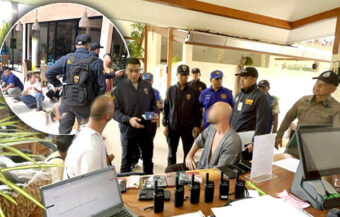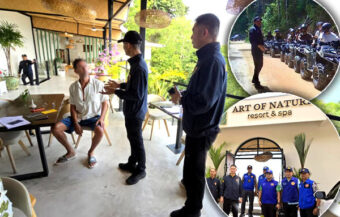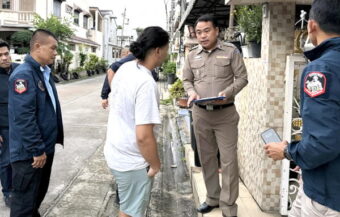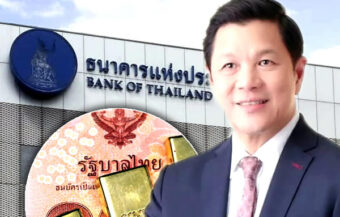Nonthaburi police inundated with calls as call centre gangs posing as officers scam Thai citizens nationwide. Victims lose thousands, with one woman in the US losing ฿200 million to the similar networks. Thai authorities ramp up efforts to curb the growing menace.
Police at Nonthaburi City Police Station on Thursday reported that their switchboards lit up in response to another wave of call centre activity targeting Thai users across the country. A deputy chief of investigations later revealed that there had been 34 victims, including one in Nakhon Sawan who lost ฿90,000 and another in Lamphun who parted with ฿40,000. The scams involved impersonators posing as police officers in Nonthaburi. Despite this, over half of the calls to the police station that day not being successful. However, unfortunate victims only called after transferring their hard-earned cash to the Chinese gangs. The menace of call centre gangs exploiting Thailand has now extended its reach to the United States, where a woman earlier this year was revealed to have lost ฿200 million.

On Thursday, police at Nonthaburi City Police Station, just outside Bangkok, reported a firestorm of calls to the station. Police Lieutenant Akkharapong Dechakun, a deputy investigation chief, was working as the radio operator at the station.
He reported that sometime before 6 p.m., dozens of people nationwide began calling the police office. In particular, they wanted to know if certain officers were stationed there. For instance, there were inquiries about Police Lieutenant Anchalee Srisawat and a certain Police Lieutenant Ratthasat.
Call centres target Thai users through scams linked to Nonthaburi Police officers, causing widespread panic
As a Thai police investigator in a province linked this year with cybercrime activity, Police Lieutenant Anchalee was quickly able to glean what was happening.
It appeared that a new campaign was being launched from offshore call centres. Often, these call centres are illegally wired or tapped into the Thai communications network, for example, through illegal cross-border cables or signal stations.
The kingdom is under attack from illegal call centres situated in no-man’s-land areas. These are located in the Golden Triangle area in Myanmar and Laos, as well as call centre fortresses in Cambodia.
The latter are often highly-secured buildings in areas of Cambodia where protection has been bought from local police services or influential people.
Cambodian cybercrime industry run by Chinese criminals could be generating up to 38% of its GDP
According to a 2023 United Nations report, some of the Cambodian networks are linked to elements close to the country’s ruling family. Particularly Cambodia’s Prime Minister Hun Manet and his government.
United Nations report links Cambodian cybercrime to the ruling cliques as Thai police battle call centres
A report issued last year by the Asia-Pacific Regional headquarters of the United Nations Human Rights Office in Bangkok estimated that tens of thousands of call centre operators were being held in Cambodia alone.
Certainly they include Thai nationals who are engaged in cybercrime activities.
On Thursday, officers at Nonthaburi Police Station revealed that 34 people had lost money that day.
Essentially, they had received calls and were prompted to pay money. The scam was one of two powerful methods in use. Basically, the victims were frightened into thinking that they had committed a crime—money laundering, which has a wide definition.
Last Thursday, police at Nonthaburi Police Station were investigating a certain Ms. Sasithorn Srisongkram. In other words, the victims were made to feel they had become embroiled in a crime.
Simultaneously, a way out was offered by paying money. As a result, 34 people handed over cash. Some amounts were as low as ฿1,999, paid by a victim in Chonburi. The scammers coaxed the victims into sending them identification cards. In turn, they opened up direct communication with them on the chat facility LINE, which is especially popular in Thailand and well-used by the scammer gangs.
Thai police chief calls for greater cooperation from social media platforms in the fight against Cybercrime
In an interview this week, Assistant Royal Thai Police Chief Thatchai Pitaneelaboot called for greater cooperation from social media firms.
This comes as the Thai police are working more closely with their American counterparts, as Thailand is now being used as a base to target U.S. residents.
“We’ve sent documents to Facebook and Google, but their responses have been inadequate,” Police Major General Pitaneelaboot said. “We hope they will revise their policies. If necessary, we might issue arrest warrants for executives from companies like LINE.”
Meanwhile, back in Nonthaburi Police Station, one victim from Lamphun province lost ฿40,000, while another in Nakhon Sawan lost ฿90,000 on Thursday. Police officers at the station heard reports about a bogus female police officer posing as an officer stationed there. Her fake identity was Police Lieutenant Mallika Naboonmee.
Thai authorities tighten banking regulations as Chinese gangs dominate illegal operations and target the US
On a national level, Thai authorities have tightened banking regulations in recent months. The aim is to make it more difficult to open and operate mule accounts. The transfer and management of illegal funds are crucial for the gangs behind these operations.
Apichet Suesat, a security analyst, suggested that 90% of the operations are Chinese-controlled. Certainly, more victims are now being targeted in the United States, specifically Thai nationals living in America.
The scammers often use data highlighting those who make online purchases. This data is either hacked or purchased online from the dark web. Bad actors can buy government records and credit card details quite easily.
In June, police in Thailand revealed the case of an elderly Thai woman living in the United States. Before moving stateside, she was a resident of Kanchanaburi. The woman had built a career as a senior management expert at a prestigious U.S. university.
She was targeted by the money laundering ruse, essentially told she was a suspect in a transnational criminal investigation. The second scam used by the call centre gangs is the romance scam, targeting people over 30.
Elderly Thai woman falls victim to the scam. Transferred ฿200 million before she realised the deception
She was led to believe she was speaking with law enforcement officials in both the United States and Thailand. Significantly, there are concerns that American nationals are now also being lured to work with the gangs.
At length, the Thai woman living in the United States transferred money multiple times before realising it was a scam. However, by then, she had parted with ฿200 million.
Take the case of a 31-year-old Thai man arrested on a March 29 warrant in the Nok Chok district of Bangkok. Mr. Sombat Kaewmanee of Pathum Thani province was charged with public fraud in addition to Computer Crime Act offences.
Police Lieutenant General Worawat Watnakornbancha, the Commander of the Technology Crime Suppression Division, outlined his story.
Notably, Sombat was one of 40 people arrested in relation to the theft of ฿200 million from the Thai-U.S. woman.
Call centre workers exploited in Cambodia face tough conditions as they participate in illegal schemes
Down on his luck at the end of 2023, Sombat applied to a Facebook job advertisement offering a salary of ฿8,000-11,000 per month. Later, he was picked up by a car in the Luk Ka district of Pathum Thani.
He was then smuggled out of Thailand to a call centre in Poipet, Cambodia. The links between casino and entertainment complexes and call centre crime are particularly significant.
In short, they provide large amounts of illegal money to be laundered. Mr. Sombat was taken across a natural border crossing into Cambodia within the Aranyaprathet District in Sa Kaeo Province.
Afterwards, he was taken to a warehouse and then walked to the back near a deep canal. He was eventually taken across the canal with a pulley device using a foam board. Afterwards, he entered a 25-story building, which became his home for six months.
He was paid ฿4,000 to open bank accounts in Thailand and ฿1,000 per day to allow his face to be scanned. He was essentially working in the control and management of mule accounts used to transfer money from victims. Finally, he was arrested by police pursuing the case of the American-Thai woman.
Join the Thai News forum, follow Thai Examiner on Facebook here
Receive all our stories as they come out on Telegram here
Follow Thai Examiner here
Further reading:
Cambodian cybercrime industry run by Chinese criminals could be generating up to 38% of its GDP
Debt and ฿1.7 million loss to scammers drive man to murder his wife and two sons in Samut Prakan
Loan shark arrested in Nonthaburi for bullying a borrower charged an annual interest rate of 730%
Bank of Thailand to tackle household debt in new plan from 2024 which will see higher standards
Politicians skating on thin ice as the economy may not be able to withstand a political stalemate
Debt crisis may be one of the top items on the new cabinet’s agenda as central bank stands ready
Potential hazard lights flashing as kingdom’s auto loans spiral into default with sky-high borrowing
Bank of Thailand governor gives veiled warning to voters on the danger posed by populist policies
Financial markets debt sell-off sending a signal to Thailand before the May 14th General Election
PM warns giveaway policies of some parties may be ‘bad karma’ for the country in the longer run
Economic recovery shaky despite strong foreign tourism as global economic outlook deteriorates
Recession fears rise as growth projections are cut and export output continues to decline in 2023
Economy faces export clogs with rules in China and ‘green imperialism’ from European Union
Vital European Union free trade deal with Thailand with stiff demands from Brussels to take time
Thailand’s financials are sound but the economy is exposed if another world banking crisis emerges
Thai economic woes grow with a 10-year high trade deficit as January exports slumped by 4.5%


















